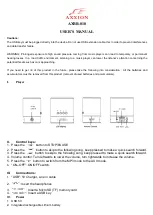
1-4
Hot Components
WARNING!
HOT EXHAUST CAN BURN YOU. ENGINE AND EXHAUST
SYSTEM PARTS BECOME VERY HOT AND REMAIN HOT
FOR SOME TIME AFTER THE ENGINE IS RUN. WEAR
INSULATED GLOVES OR WAIT UNTIL THE ENGINE AND
EXHAUST SYSTEM HAVE COOLED BEFORE HANDLING
THESE PARTS.
Work Area
• Keep your work area clean and well lit. Cluttered benches and dark
areas invite accidents.
• Do not operate power tools in explosive atmospheres, such as in the
presence of flammable liquids, gases, or dust. Generators create
sparks which may ignite the dust or fumes.
• Keep bystanders, children, and visitors away while operating a
generator. Provide barriers or shields as needed.
Electrical Safety
• Keep all electrical equipment clean and dry. Replace any wiring
where the insulation is cracked, cut eroded part or otherwise
degraded. Replace terminals that are worn, discoloured, or
corroded. Keep terminals clean and tight.
• Insulate all connections and disconnected wires.
• Do not abuse the power cord. Keep power cords away from heat, oil,
sharp edges, or moving parts. Replace damaged power cords
immediately. Damaged power cords increase the risk of electric
shock.
• Do not operate the generator with wet hands. Do not expose
generator to rain, snow or wet conditions. Water will increase the risk
of electric shock. The generator is a potential source of electrical
shock if not kept dry.
• Do not attempt to connect or disconnect load connections while
standing in water, or on wet or soggy ground.
• Do not touch electrically energized parts of the generator and
interconnecting cables or conductors with any part of the body, or
with any non-insulated conductive object.
• Avoid body contact with earthed surfaces such as pipes, radiators,
ranges, and refrigerators. There is an increased risk of electric shock
if your body is earthed.
• When operating a power tool outside, use a premium quality outdoor
extension cord. These extension cords are rated for outdoor use,
and reduce the risk of electric shock.








































